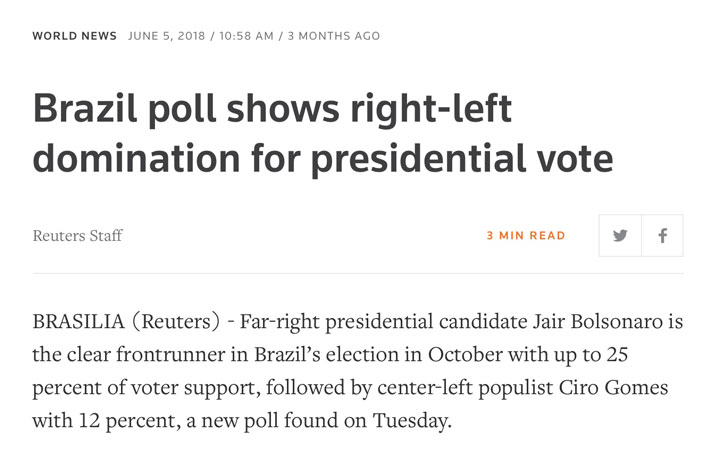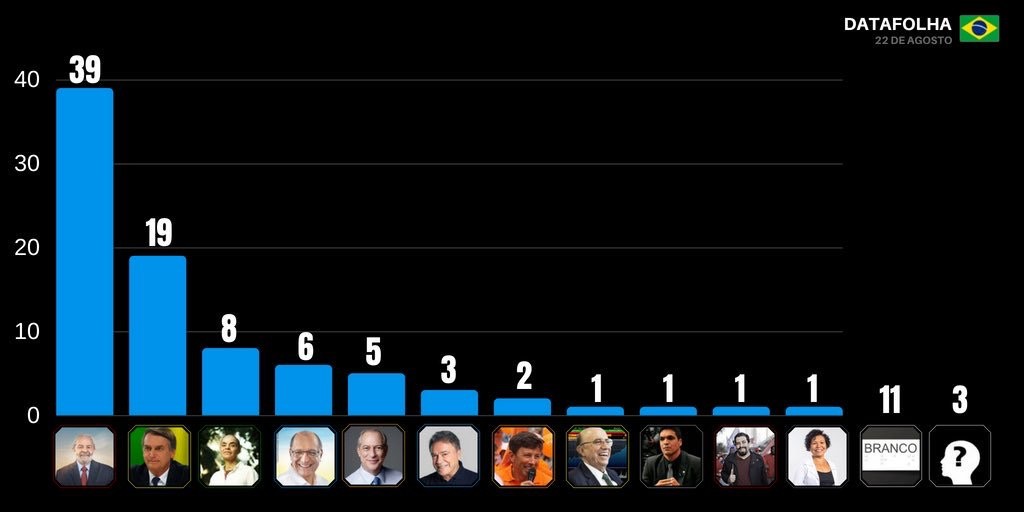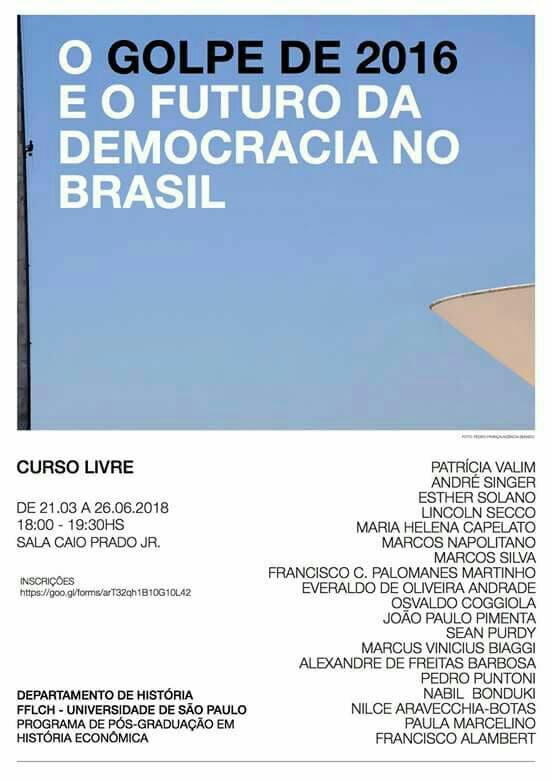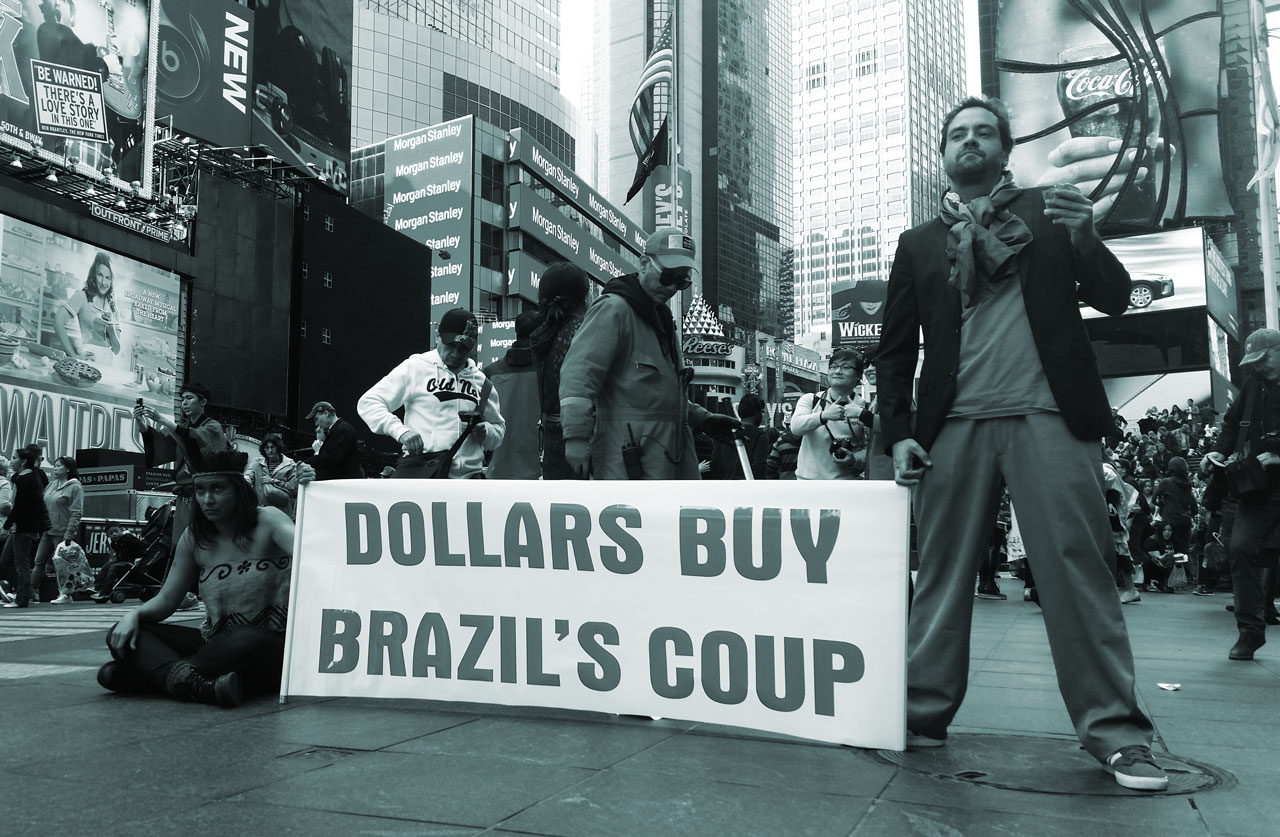Two competing narratives on Brazil: one says Dilma Rousseff was deposed in a procedural Coup d’état and Lula’s imprisonment is to stop him becoming President again. The other says that all of the above is totally legit.
One of these narratives has Wall Street and Big Oil right behind it. Can you guess which?
Coup-Denial in Anglo Media went away for a while, but now, with a historically pivotal election looming and its leading candidate in jail on trumped up charges, it is back amongst full spectrum corporate propaganda. With award-winning Documentary ‘The Process’ (O Processo) emphatically exposing the actual nature of Dilma Rousseff’s impeachment, it seemed like we had seen the end of this rhetoric.
Here we look at some of the worst culprits, and the vested interests behind them.
When the “Fake News” scare first broke in 2016, a graph circulated across social media in its wake, ostensibly showing comparative reliability of Anglo media platforms, their political positions and so on. But the graph itself was in essence “Fake News”, with no data, no qualitative analysis to corroborate itself, and based on facile assumptions about establishment media reliability. For example, newspapers which openly lied in unison to build public support for the Iraq invasion were lauded for their accuracy and honesty.
The graph was received as it had been created, dripping with confirmation bias – the “filter bubble” in action. A Brazilian version also circulated which gave the infamous likes of Globo and Veja far too much credit for their impartiality and accuracy.
Now as anyone watching the rapid ethical decay of corporate media should know, fake information is rarely how false narratives are spun there, at least now. Censorship by omission is far more subtle and effective, and cannot be “fact-checked“.
So as the horror of Temer’s Wall Street-friendly programme was revealed in the hours, days and weeks after he took control, it was clear to observers that this had not just been a coup against a Brazilian President, but against the Brazilian people, yet this was not reflected in Anglo media coverage of the country.
As Arthur Ponsonby famously wrote: ‘When war is declared, truth is the first casualty’. What is happening in Brasil and Latin America isn’t business, politics or media as usual (and never really was). It is a form of warfare, “war by other means“, a war with the same rewards, a war in which the Atlantic powers never sleep. When that is as clearly understood in media as it is in academia and the unions, perhaps the level of mainstream discourse will improve. But right now, if you want a career in journalism down old South America way, be prepared to pretend that Empire does not exist, and/or to actively promote it.
As ever, processing Anglo media coverage of Brasil and Latin America is made easier by looking behind the curtain. For example, understanding that anything significant and consequential in say, BBC coverage, will be to some extent, led and/or vetted, by the UK Foreign Office – this is part of the BBC’s international remit after all. Its then correspondent, previously embedded with so called “moderate rebels” during the UK-led destruction of Libya, flat out denied that the events of 2016 constituted a coup. It is an unfortunate coincidence then, that one of the principal foreign beneficiaries from regime change in both Brasil and Libya was the British Petroleum industry, and that it, and a UK Government which serves its interests, were discreetly in favour of Dilma Rousseff’s removal. More recently the BBC has been caught promoting Brasil’s most notorious “fake news” organisation, associated far-right activists, and enthusiastic supporters of Fascist Candidate Jair Bolsonaro.
There’s an informal mini industry in Brazilian coup-denial, and corporate media distortion across Latin America in general. This is interconnected via corporate media platforms, think tanks, philanthropic funding, corporate PR / intelligence companies or directly to Big Oil, Pharma, GMO/Pesticides, Minerals, Banking and other interests. It is surprisingly straightforward. These networks are for the most part hiding in plain sight, yet with most journalists seemingly oblivious to their role, in denial of it, resigned to it, or in some cases, actively collaborating with them. Unfortunately, journalism isn’t an industry with much room for manoeuvre in 2018, and investigative journalism is almost non-existant. Corporate / Political PR is a far more lucrative and stable path.
Neoliberalism is not fond of Democracy when it doesn’t go its way, and over-reliance on the financial press, which doesn’t face the same crisis of funding that other media platforms do, is a widespread problem. Until recently, the Wall Street Journal was openly defending Chiles 1973 Coup and Pinochet’s Neoliberal Dictatorship, but Bloomberg is, with some distinction, the most worthless Brasil news platform. Its coverage is predicated on an unquestioning belief in market forces, yet unlike the Economist, Bloomberg’s position is undeclared. If you’re a futures trading Libertarian sociopath, it is for you. If you have a human soul, avoid exposure to it.
Reuters has been criticised for its coverage of Latin America’s recent history such as this instance when it tried to bury a horrific story involving a US DEA agent’s harrassment of a Brazilian Woman. It actually appeared to improve briefly, after the 2015 exit of Brian Winter (@BrazilBrian on Twitter). Winter moved to Wall Street Lobby and Neoliberal Think Tank AS/COA, where he leads policy, writes for and edits Americas Quarterly magazine. He left Reuters following the “We can take this out if you think better” (“Podemos tirar se achar melhor”) scandal, where he was accused of censoring the US-favoured PSDB party’s involvement in the Petrobras corruption schemes that pre-dated Lula and PT’s period in office. This briefly risked bringing down an entire narrative being so carefully constructed, that PT were the de-facto “party of corruption“.
In June 2018, Reuter’s published this, which claimed that fascist Jair Bolsonaro was “leading the polls” with a footnote that Lula was unable to run due to a “corruption conviction”. Both of these assertions were demonstrably incorrect. Lula led by over 10% already (he leads now by 20%). If and when Lula is prevented from running, by whatever judicial means, it hasn’t happened, and Reuters were in no position to depict that it had in June. This “Lula can’t run” falsehood has been repeated verbatim all over the right-wing media. TV Globo now effectively pretending that there is no Workers Party candidate in the election. The UN Human Rights Commission has warned in early August that the Brazilian Government that Lula must be allowed to run, and have access to the media.

It seems to be predominantly from Bloomberg and Reuters that new waves of coup denial are coming, which is unsurprising, as they were its perpetuators prior to and during Dilma Rousseff’s impeachment, and their personnel are tightly connected, professionally, socially, and ideologically.
Their staff could be seen pushing the synchronised narratives that were a feature of 2014’s election and the lead up to 2016’s coup, and they were complicit in infantilisation, gaslighting, through to the complete erasure of Brasil’s left in English. This was one of the reasons Brasil Wire was originally founded.
When the coup-denialist “Brasil’s institutions are working” mantra became untenable, for example with the release of Senator Romero Jucá’s “A big agreement, with the Supreme Court and everything” (com Supremo, com tudo) recording, most of these commentators went silent on the subject, and with good reason, their credibility would have been obliterated.
Now, with 2016 what they hope is a distant memory, and an election looming with its leading candidate jailed after a kafkaesque, politically motivated trial, Anglo-Brazilian Twitter looks very much like March 2016 all over again, and they’ve doubled down on the coup-denialist depiction of of the now farcical Operation Lava Jato as an essential stage in the country’s moral development. Regardless of the illegal US DoJ involvement, damage it has done economically and politically, their schtick is that this painful process will bring “political renewal”, of the spurious variety promoted by RenovaBR, which is in practice the eradication of the left and centre left from positions of power, leaving the old structures intact, with a handful of photogenic conservative youngsters up front (as seen here in the NYT). These candidates are spread across traditionally Wall Street-favoured PSDB, Dictatorship-heir party Democratas and Itau bank’s Libertarian Partido Novo, the latter two also home to prominent young fascists, dressed up in the language of liberalism. These were the some of the same faces splashed across media in 2015/16 to give the coup an appearance of youth and modernity.

August 22 DataFolha poll had former President Lula 20% ahead of nearest rival, fascist Jair Bolsonaro, and on brink of a first round victory
In early August 2018 the Anglo corporate deniers began to put their heads above the parapet. In unison the scare quotes returned around the word “Coup” although now they were using the Portuguese “Golpe”. Did they perhaps want to avoid using “Coup” altogether?
A Bloomberg hack’s complaint that the word Golpe had been “banalised” was enthusiastically picked up by a Reuters-connected writer, and long time critic of the Brazilian left. He attempted to argue that this vindicated those who refused to use the word in 2016.
Also originating at Bloomberg was a suggestion that the the Workers Party engaging in realpolitik (making state or city level election alliances with parties of which some deputies supported the impeachment), somehow proved that it wasn’t a coup.
Former Reuters Brasil chief Winter then had Americas Quarterly publish what he called “a more honest” version of Lula da Silva’s NYT op-ed, in which the former president had articulated the slow motion coup in progress these past years, up to and including his own politically motivated prosecution and imprisonment, widely understood as intended to stop him running in, and winning, the 2018 election (in which he currently leads by 20% with 39% of voting intention). There was no irony lost in a professional ghostwriter for right-wing, US-allied Leaders across Latin America (such as Colombia’s Alvaro Uribe and Iván Duque, and Brasil’s own Fernando Henrique Cardoso), whose job it is to construct Wall Street-friendly narratives on the region, accusing the jailed Lula da Silva of conjuring his own.
With astounding arrogance, Winter followed this by actually forcing edits in the published Lula NYT op-ed, perhaps helped by the influence of colleague Juliana Barbassa, who had recently moved from editing Americas Quarterly to take over the Latin America desk at the “paper of record“.
One thing is certain, since the UN Human Rights Commission ordered that Lula must be allowed to stand for President, Wall Street and its allied local elites are again terrified of a Lula presidency, to the point that all powerful TV Globo are erasing the Workers Party candidacy altogether.
Reuters and Bloomberg, especially the latter’s veteran Mac Margolis (a grandmaster of bad Brazil takes), are the closest outlets to AS/COA, and most prone to picking up and running with its boilerplate corporate narratives. This is part institutional, part personal, and the likes of The Guardian and Washington Post also tag along – Democracy dies in darkness, indeed.
Promotional video made by AS/COA for the US-led “War on Corruption” in Latin America.
AS/COA corporate members have been amongst the biggest beneficiaries of the Temer Government’s unmandated Neoliberal turn. ExxonMobil, Chevron, BP, Monsanto, BlackRock, Microsoft, Boeing and others have all reaped the rewards. AS/COA and its magazine Americas Quarterly exist solely to represent those interests, and influence local politics in ways which benefit them. Prosecutor General Rodrigo Janot told Davos in 2017 that Operation Lava Jato – which is supposedly politically neutral – was “Pro Market”. The Atlantic Council’s Latin America wing has also been reinforcing these kind of narratives since 2013, in particular, bizarrely disproportionate and uncritical Anglo media coverage of Lava Jato, which resembles an orchestrated international PR campaign (see above video).
When this kind of embedded PR combines with Journalists who freely call it a coup in private but won’t publicly for whatever reason, there is left a gaping hole in the narrative on Brasil which is why the present conjuncture makes so little sense to outsiders.
And that confusion is useful, it enables deniability and reduces the coup to a matter of opinion. To put that in context there are currently around 40 universities running courses on the Coup of 2016, and a dozen or so scholarly book publications on the subject.

Publicity for University of São Paulo’s course on the Coup of 2016 – one of around 40 nationwide.
The Coup is taken for granted amongst most progressives, and not only with Petistas, but PSOL, PCdoB, and other parties, sitting and ex-Presidents from Latin America and Europe, academia, and the international organized labour movement, as is the political nature of Lula’s imprisonment (his polling numbers speak for themselves). It has not even been subject to debate for two years. The burguesa centre-left are often the kind of people Anglo journalists based in Brasil socialise with, and they understand this, yet when taking to twitter or in print, they depict, by omission or otherwise, the exact opposite of their understanding.
Another coup-denier, ex-Bloomberg writer, who once even tried to cast doubt upon US involvement in the coup of 1964, was anointed go-to guy for supposed neutral positions on Brasil in 2016, written for opinion forming magazines such as New Yorker and the Atlantic, and the New York Times itself. This was just enough to obfuscate the situation in the eyes of an influential readership. As her impeachment neared its conclusion, with crowds of resistance in the streets being teargassed and shot with rubber bullets. he claimed that “only Dilma Rousseff supporters thought it was a coup”, which was false. He later discreetly apologised on social media for his “imprecision”.

There is ample material on the coup of 2016 in Portuguese. Little or none of this information makes it into Anglo media.
Any notion that the coup was some kind of fantastic and elaborate PT cover story devised for their own protection mimics the rhetoric of the coup perpetrators themselves and its right wing supporters. Every coup in modern history has been denied by its perpetrators, and every political prisoner is officially jailed for another reason. The putschist mantra of 2016: “We won’t have a Coup, we will have an impeachment” is now replaced by “A politician in prison is not a political prisoner”.
Not only is the coup-denial of corporate commentators easily countered with uncontroversial information, this renewed spin is deeply disrespectful to colleagues who risked dismissal for so much as using the word.
Indeed, Anglo apologism for the coup is even darker, as it tacitly endorses all the far-right rhetoric, quasi-legal manipulation, censorship, oligarchic media distortion, spectacle arrests, authoritarianism, violence and repression which surrounded Rousseff’s removal, and continue since. And the witch hunt against Lula and the Workers Party, in which they have been complicit, spawned a monster in the form of fascist Jair Bolsonaro, currently in second place behind the former president in the polls.
In her book United States Penetration of Brasil, which blew apart the official US Government narrative on what had happened from 1962-76, Jan K. Black quotes Brazilian journalist Genival Rabelo, whose generation faced the same professional dilemma, but at least recognised it: “This is the sad choice: to swim against the current, standing firm on a legacy of convictions… or to leave ourselves at the mercy of the current, fattening ourselves like pigs for – who knows? – the inexorable sacrifices of the great feast of the conquerors.”. In the book, rare but essential reading on Brazilian history, Black, a Professor and former CIA researcher, forensically recorded a myriad of processes, the methods of institutional penetration in a sovereign country, that look extremely familiar in 2018.
Overlooked in Anglo media was that many of the 2016 coup’s main protagonists were the children and grandchildren of 1964, and at the time it was reticent to acknowledge the nature of 1964’s coup. Instead it was called a “Democratic Revolution”, a phrase used by supporters of its 2016 counterpart. Indeed soon to be defeated Presidential Candidate Aécio Neves even used similar words publicly in April 2013 to describe what happened 50 years prior.
Likewise, mediocre hacks, self-appointed gatekeepers on Brasil for the English-speaking World, with absolute disregard for its national sovereignty, are unlikely to acknowledge the Coup of 2016-18 nor foreign involvement in it, at least until the coast is clear – who knows, perhaps in 10 years they’ll write a book on the subject and cash in. At the same time they’ll then be able pretend to their leftish friends back home to have been on the right side of history all along.
It is insufficient for progressive forces to simply conflate these kind of influences, interests and relationships within a nebulous notion of “transnational capital”, as if some natural force. Instead it is essential that they are properly explored, investigated and documented. Only then can these networks be resisted and broken.
There is an enormous amount at stake in Brasil, the most resource rich nation on the planet, and the intensity of corporate propaganda surrounding it isn’t difficult to understand.
You only need to follow the money. Same as it ever was.
[qpp]

